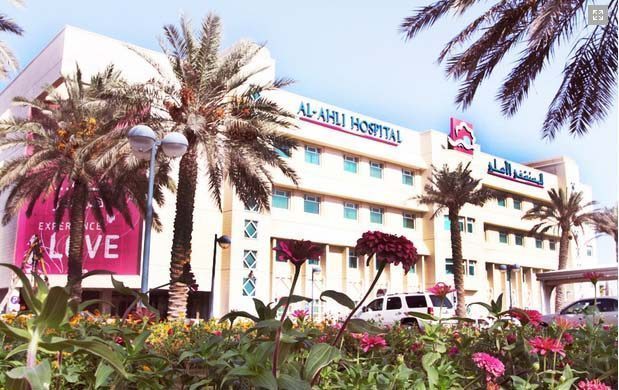
This week, Doha News highlighted some of the problems pregnant mothers face in delivery rooms across Qatar, and the care that follows birth.
In the third and final story of our Giving Birth In Qatar series, women share their experiences with pregnancy loss and the medical treatment they received.
Although impending motherhood is usually a joyful time, as many as one in five pregnancies can end in miscarriage or still birth.
Sometimes, the feelings of grief, guilt and loss that follow can be devastating.
Doha News has spoken to three Qatar-based expats whose pregnancies did not turn out as they had hoped.
The women, who have requested to remain anonymous, expressed disappointment with some aspects of care they received during this time, and have recommended some changes.
A frightening operation
The first woman, who we will call Elizabeth, was 10 weeks pregnant when she was admitted to Hamad Women’s Hospital in 2014.
An ultrasound scan had revealed that her fetus stopped developing, but remained in the womb, resulting in a so-called “missed miscarriage.”
Elizabeth spent four days in the hospital, during which time she said she received no information from doctors about what they intended to do.

HMC declined to comment on its policies regarding missed miscarriages.
However, Elizabeth may have been kept waiting because doctors are instructed to confirm the “death” of a fetus repeatedly before any procedures can be performed to remove it.
This is partly due to fear of accidentally terminating a viable pregnancy.
The expat told Doha News that she was eventually told a dilation and curettage (D&C) procedure would be conducted to remove the fetus.

However, she said she ended up needing an emergency operation instead.
Afterwards, she said that doctors were dismissive of her grief, and did not talk to her about what had happened.
“The message was it was God’s will. There was no compassion, no aftercare, no counseling. It is just not talked about here,” she said.
Second pregnancy
Around a year later, Elizabeth became pregnant again. But her water broke very early, at 20 weeks gestation.
After her difficult experience at HMC Women’s, she went to Al Ahli hospital this time instead.

But she did not receive the support she had hoped for from doctors there, either.
“They said they were going to induce me, so we had a night of being upset about that, then got prepared for it.
But they then told us they couldn’t because abortion is illegal (and the chances of the baby’s survival were slim). So they sent me home saying to come back when the baby died.”
Instead, Elizabeth went back to Women’s Hospital, but they were also unable to help her, she said.
Eventually, she flew home to the UK, where her baby daughter died at birth.
However, she said that the care she received there was much better than what she experienced in Qatar:
“It was such a relief to be treated compassionately like a human being, and as a bereaved parent should be.
We were recognized as bereaved parents. Not someone who has chosen an abortion. That’s how it should be everywhere,” she said.
Lack of sensitivity
The second woman who spoke to Doha News, who we will call Sima, also felt that the doctor who diagnosed her missed miscarriage in 2014 did not take her feelings into consideration.

Though an early ultrasound had shown a heartbeat and raised Sima and her husband’s hopes, a scan at 14 weeks brought bad news.
Sima said she went to Safa Polyclinic after experiencing some bleeding and was told that the fetus had no heartbeat.
“I asked her (the doctor) if the baby was ok and it took her what felt like an eternity to answer that it was not.
And then for some reason she pointed at the screen and brought out a snapshot of her previous patient, saying ‘see, this is how a healthy baby would look.’ I thought that was insensitive.”
The doctor then quizzed Sima about whether she had “done anything” that might have caused the miscarriage – for example, whether she was under stress.
She was also asked if she wanted the doctor to talk to her husband “so she didn’t get in trouble,” which appeared to be a cultural assumption based on the couple’s Indian background.
Strict abortion policy
On the doctor’s recommendation, Sima went to Hamad Women’s Hospital. She was admitted the next day, and the hospital carried out repeated scans to confirm the miscarriage.
“It was pretty traumatizing to keep seeing the fetus floating around, lifeless, in the ultrasound,” she said.
Although she expressed a desire for a D&C (the operation to remove the fetus), Sima said that the doctors “argued” about their options, due to Qatar’s strict abortion policy.

Instead of operating, medical staff said their protocol was to use a vaginally inserted medicine to induce a miscarriage.
This had frightening consequences for Sima:
“This caused me to bleed excessively and eventually faint, thanks to a nurse who ignored what I said about what was happening.
I remember passing out on my way from the bathroom to my bed and the nurses looking very concerned and trying to revive me.”
Doctors eventually performed a D&C and according to Sima, also took the remains to be “examined,” without her consent.
Admin frustrations
The third woman who spoke to Doha News, who we will call Maria, was also given terrible news during an ultrasound consultation.
She was 26 weeks pregnant last year when doctors at HMC’s Cuban Hospital discovered that something was wrong.

“Our ultrasound specialist detected something abnormal in the brain liquid measurement of our baby,” she said.
Maria and her husband were referred urgently to the Fetal Maternity Unit (FMU) of Hamad Hospital, which specializes in pregnancy complications.
The couple went there the next morning to try to make an appointment, and Maria’s husband was told he could not enter.
“I felt immediately diminished by not having my husband with me but well, I had no choice,” Maria recalled.
She then went inside the unit by herself, only to be turned away because the hospital had not yet received an official referral from Cuban – despite the fact that Maria had a letter from her doctor.
“I was in tears and begged the reception to consider my case or call a doctor who will at least consider reading my referral letter.
But there were unfortunately nothing to do and no one at the FMU was able or willing to help me, so I joined my husband on the outside of the FMU totally broken.”
Several days later, the FMU did receive the letter, but attempts to chase up her appointment by telephone failed.
Stillbirth
It was at this stage that the couple decided to return to their native France for an urgent consultation.
While she was in Paris, Maria finally received a call from the FMU with an appointment date, three weeks later. She declined.
At seven months pregnant, the couple were given devastating news.

“An MRI revealed that the brain damage on our baby girl was more severe than expected,” Maria said.
She delivered her baby – a daughter – stillborn in Paris last September.
Despite this tragedy, she said that she and her husband received great care in France.
“We had the most caring doctors and midwives. It was the best decision (to travel to France for care) in an unfortunate situation that we ever made.”
Calls for change
Reflecting on her experience, Maria said that she hopes HMC will change its policy and allow husbands into consultations at the Women’s Hospital.
“I can’t imagine going through this without my husband beside me in every doctor’s visit. The mental support that our partner gives during difficult times is very important,” she said.
Elizabeth, meanwhile, said she hoped that Qatar’s hospitals would revise their policies to make it easier for D&Cs in cases like hers.

She said that concerns about Qatar’s abortion laws seemed to cloud her doctors’ judgement:
“All of the doctors I met told me initially that I had to be induced due to the very high risk to me. Sepsis is a common outcome if nothing is done to help.
But when it came down to it, no one wanted to do anything. Their hands were tied.”
Finally, all three women rued the lack of emotional support throughout the process, as no counseling was offered.
HMC’s response
Doha News asked HMC for its response to the issues raised in this article.
In a statement, it said that although it was unable to comment on specific cases, the Women’s Hospital “strives to deliver first-rate services to all the women of Qatar.”
“Each woman has different needs and each and every patient is assessed and monitored by our highly trained clinical teams to ensure they receive the most appropriate and best possible care at that time,” it added.
Thoughts?







